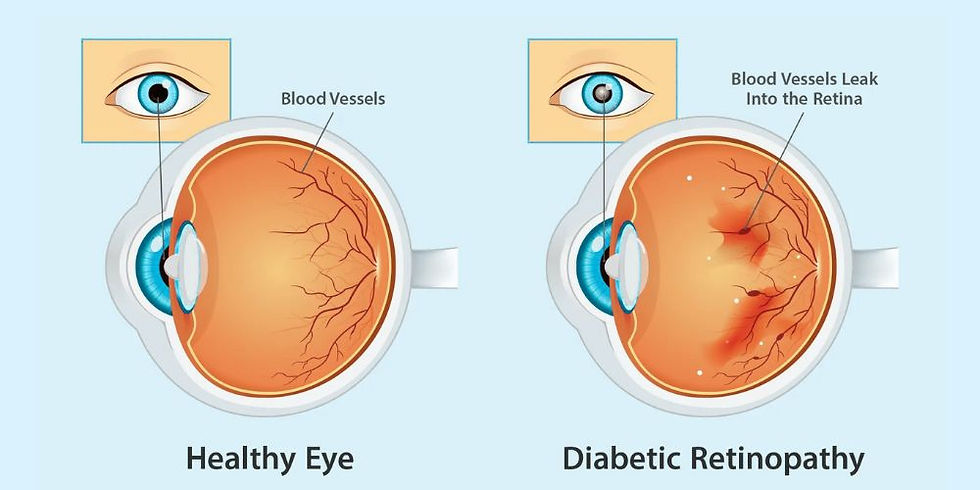Diabetic Retinopathy: How Diabetes Affects Your Eyes
- Arunodaya Deseret Eye Hospital
- Nov 5, 2025
- 4 min read

Diabetes isn’t just about blood sugar - it’s about your entire vascular health, including your eyes. Over time, uncontrolled blood-glucose levels damage the tiny blood vessels in the retina, leading to Diabetic Retinopathy (DR) - a leading cause of preventable blindness worldwide.
In India, where diabetes has reached epidemic proportions, ophthalmologists like Dr. Vaibhav Sethi, Consultant Vitreo-Retina Surgeon at Arunodaya Deseret Eye Hospital (ADEH), Gurgaon, warn that regular retina screenings are crucial for protecting vision.
“The problem with diabetic retinopathy is that it’s silent at first - no pain, no warning. By the time patients notice blurred vision, damage is often already done.”- Dr. Vaibhav Sethi, ADEH Gurgaon
World Diabetes Day 2025: A Global Call for Vision & Well-being
Every year, World Diabetes Day is celebrated on November 14 - the birthday of Sir Frederick Banting, one of the discoverers of insulin. It’s a day devoted to raising awareness about diabetes, its complications, and its impact on daily life.
The official theme for World Diabetes Day 2025 is “Diabetes and Well-being,” with a sub-theme emphasizing “Diabetes and the Workplace.” This year’s focus highlights how managing diabetes effectively in professional and personal settings is essential for holistic well-being - including eye health.
For many working adults, long hours, stress, irregular meals, and screen exposure can worsen both blood-sugar control and eye strain. Dr. Sethi explains that integrating eye-care awareness into workplace wellness programs can prevent early diabetic retinopathy.
“Your workplace habits - from diet and stress to screen time - play a major role in protecting your vision. Eye well-being must be part of every diabetes care plan.”- Dr. Vaibhav Sethi
In recognition of this global theme, Arunodaya Deseret Eye Hospital (ADEH) is actively promoting its awareness initiative “Diabetes and the Eyes” throughout November 2025, featuring screenings, educational talks, and community outreach.
What Exactly Is Diabetic Retinopathy?
Diabetic Retinopathy is a complication where prolonged high blood sugar damages the small retinal blood vessels, causing leakage, swelling, or closure. The result: blurred vision, floaters, or even blindness if untreated.
Two Main Stages of DR:
Non-Proliferative Diabetic Retinopathy (NPDR) – early stage; small leaks or microaneurysms form.
Proliferative Diabetic Retinopathy (PDR) – advanced stage; fragile new blood vessels grow and may bleed into the eye.
Without early detection, the disease can progress silently.
Warning Signs You Should Never Ignore
Blurred or fluctuating vision
Dark spots or floaters
Difficulty seeing at night
Sudden loss of vision
Pressure or pain inside the eye
If you notice any of these, schedule a retina examination immediately.
How Diabetes Damages the Eye
High sugar levels → weaken blood-vessel walls
Protein leakage → retinal swelling and macular edema
Restricted blood flow → oxygen starvation to retina
Abnormal vessel growth → bleeding and scar tissue
This cascade can lead to retinal detachment or permanent vision loss if untreated.
Diagnosis and Treatment at ADEH
At Arunodaya Deseret Eye Hospital, Dr. Vaibhav Sethi and his team use state-of-the-art diagnostics such as Optical Coherence Tomography (OCT) and OPTOS Ultra-Wide Fundus Imaging to detect diabetic retinopathy early.
Treatment Options
Laser Photocoagulation – seals leaky vessels.
Intravitreal Injections (Anti-VEGF therapy) – reduces swelling and halts new vessel growth.
Vitrectomy Surgery – removes scar tissue or blood to restore vision.
Systemic Control – maintaining optimal sugar, BP and lipid levels.
“The earlier we act, the better the outcomes. A simple retina scan can save your sight.”- Dr. Vaibhav Sethi
Preventive Eye-Care Tips for People with Diabetes
Schedule annual dilated retina exams.
Maintain blood-sugar (HbA1c < 7%), BP < 130/80 mmHg.
Eat a diet rich in leafy greens, whole grains and omega-3 fats.
Quit smoking and limit alcohol.
Follow the 20-20-20 rule for screen breaks.
Why Choose Arunodaya Deseret Eye Hospital in Gurgaon
Located in Sector 55, Gurugram, ADEH is a not-for-profit, world-class tertiary eye institute committed to community eye health.
With decades of experience, ADEH offers comprehensive retina services - from diagnostics to advanced surgery - all under one roof.Under the leadership of Dr. Vaibhav Sethi, the Vitreo-Retina Unit has become a trusted center for the management of Diabetic Retinopathy across Delhi-NCR.
FAQs
Q1. Why is World Diabetes Day important for eye care?
Because it reminds us that managing diabetes means protecting our eyes too. Early screenings save vision.
Q2. Can Diabetic Retinopathy be prevented?
Yes - with tight sugar control and yearly retina exams.
Q3. How does workplace stress affect diabetic eyes?
Stress raises blood sugar and BP, which accelerates retinopathy. Mindfulness and regular breaks help.
Q4. Are laser or injection treatments painful?
Most are quick, painless and done under numbing drops.
Q5. How often should diabetics see an ophthalmologist?
At least once a year - more often if you already have retinal changes.
Q6. Who is the best retina specialist in Gurgaon for Diabetic Retinopathy?Dr. Vaibhav Sethi,
Vitreo-Retina Consultant at Arunodaya Deseret Eye Hospital, is renowned for his expertise in managing complex diabetic eye diseases.
On World Diabetes Day - November 14, 2025, as the world embraces the theme “Diabetes and Well-being” and the sub-theme “Diabetes and the Workplace,” let’s remember that well-being begins with sight.
Take charge of your eye health - schedule your retina check-up with Dr. Vaibhav Sethi at Arunodaya Deseret Eye Hospital, Gurgaon, and be part of a movement that’s changing lives through vision awareness and preventive care.









Comments